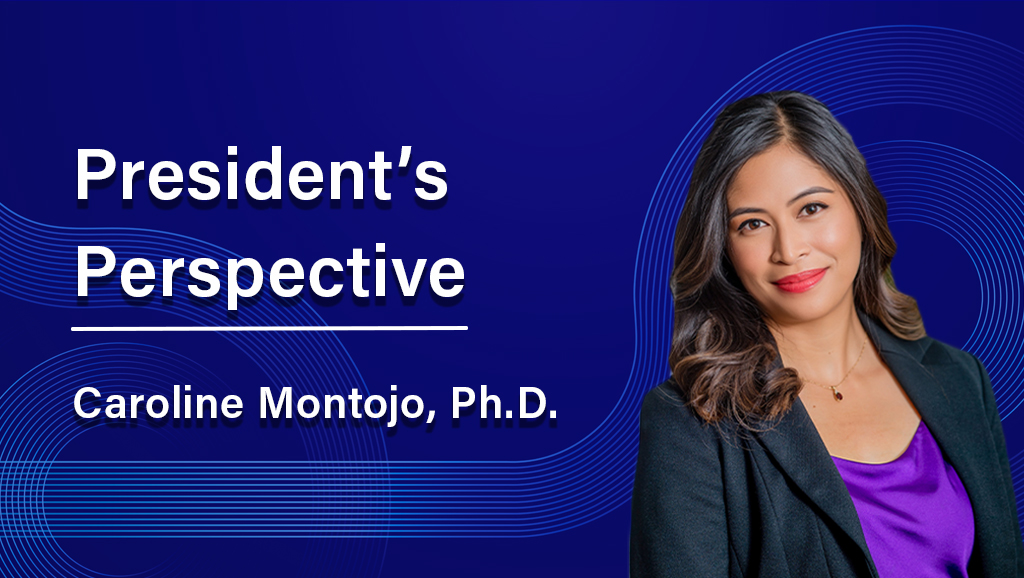President's Perspective
A Paradigm Shift in Neuroscience with the Dana Center Initiative

Where do we want neuroscience to take us, how far is too far, and where can it most benefit our lives? These fundamental and deeply challenging questions are critical to ask, as the neuroscience field flourishes in an exciting renaissance period. Just over the past decade, major strides have been made in understanding the brain as well as in the prediction and treatment of diseases such as Alzheimer’s and Parkinson’s, along with psychiatric conditions. Take brain-computer interfaces, for example, which have the ability to read and write our brain activity. They can restore movement and speech for people who have lost those abilities. But there are also important issues that arise as these technologies further develop: Who will have access? Should they be used to enhance people? These kinds of questions require a diversity of perspectives, including community voices, to shape how science benefits people.
Inspired by the evolution of neuroscience, in 2021, the Dana Foundation embarked on its new mission to advance neuroscience that benefits society and reflects the aspirations of all people. The next year, in May 2022, we launched an open call for planning grant proposals for what we envisioned as the Foundation’s flagship project, bringing together leading academic institutions, neuroscientists, and the communities they serve to co-create the future of neuroscience. We evaluated over 40 applications and selected 11 institutions to fund a five-month demonstration project illustrating the spirit of work for a potential Dana Center. After a rigorous final evaluation process involving a diverse group of external reviewers, we selected institutions to partner with on our mission.
On behalf of the Dana Foundation, I want to congratulate the University of California, Los Angeles (UCLA), Charles R. Drew University (CDU), and Loyola University Chicago on their newly launched Dana Center Initiative. The UCLA-CDU Dana Center will bring together scholars from the neurosciences, social sciences, and humanities to work with local clinician-scholars and community partners. It will also act as an incubator for generating new ways to develop research collaborations, train the next generation of scholars, and inform policy and decision-making in ways that genuinely partner with community members. Loyola University Chicago will host a Dana Center Program focused on providing neuroscience training and access that help support a STEM (science, technology, engineering, and mathematics) identity and desire to pursue STEM careers among pre-college students, including middle school and high school students. It will also provide community micro-grants and host challenges in arts, business, and journalism to incentivize exploration of the linkages between neuroscience and community aspirations.
I envision that the Dana Center Initiative will be a catalyst in the near- and long-term. In the near-term, the Dana Center Initiative will grow the next generation of multidisciplinary scholars and leaders. It will create new models for community involvement in neuroscience research and neurotechnology development. In the long term, I see these investments and field-building efforts spurring change at the systemic, institutional level. We already see this work catalyzing a shift in academic science culture through the execution of demonstration projects at the eleven semi-finalist Dana Center institutions. University administrators recognized the value in cross-disciplinary work and multidirectional community engagement through these projects and some continued supporting the work at their institutions. I also hope that these value demonstrations for education, training, and public engagement on neuroscience and society issues may eventually serve as a blueprint for other fields. Most importantly, I envision this work ultimately enabling neuroscience to more effectively benefit society by bringing more perspectives into science and technology.
This is only the beginning of our journey to build the field of neuroscience and society. I’d like to recognize Dana staff members Khara Ramos, Ishan Dasgupta, Farron McIntee, and our external reviewers for their thoughtful efforts to select our university partners. We also appreciate the many Dana Center applicants who shared their vision for connecting neuroscience to society.
We call on other public and private institutions that support neuroscience to incorporate more education, training, and public engagement on the ethical and societal implications of science and technology. I believe that we have a critical—but shrinking—window of opportunity and a responsibility to proactively consider how neuroscience and neurotechnology can benefit everyone. We welcome collaboration and partnerships with science foundations and federal agencies, recognizing the potential of leveraging the strengths of different funders of neuroscience. The Dana Foundation’s staff are happy to share about our programs and resources, consult or advise on incorporating this kind of support into programmatic strategy, and explore co-funding opportunities. Our hope at the Dana Foundation is that the launch of these centers will serve as a catalyst and call to action to strengthen neuroscience’s positive role in the world.
Recommended Reading

Advancing Neurotechnology Responsibly: The Power of Collaboration

Strengthening Public Understanding of Brain Science Through Health Practitioners

